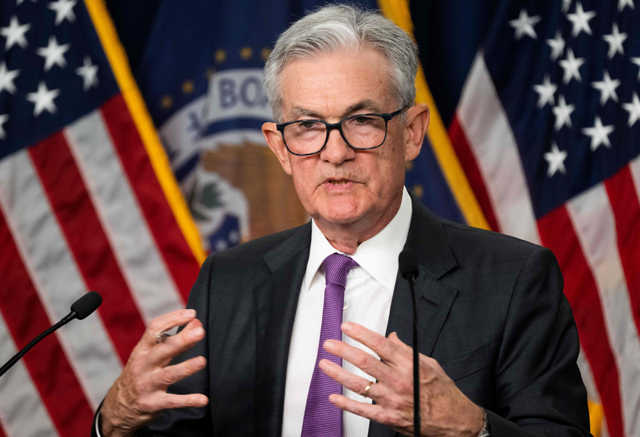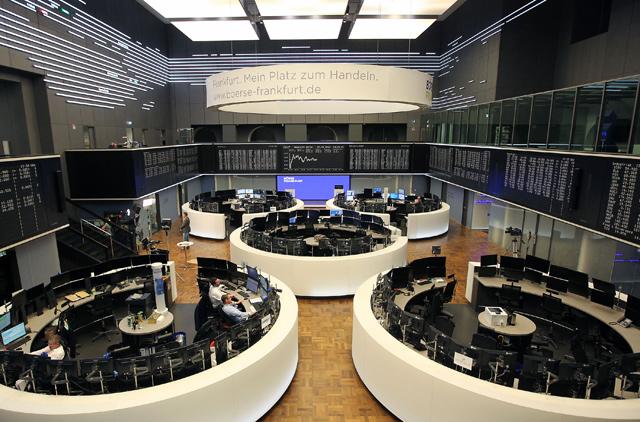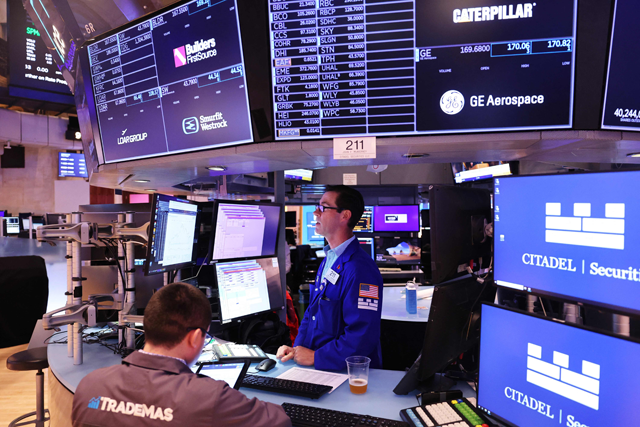You are here
Powell says US Fed could 'raise rates further', but urges caution
By AFP - Aug 26,2023 - Last updated at Aug 26,2023

Federal Reserve Board Chairman Jerome Powell speaks during a news conference following a Federal Open Market Committee meeting, at the Federal Reserve in Washington, DC, on July 26 (AFP photo)
WASHINGTON — The US Federal Reserve (Fed) is prepared to raise interest rates higher — and hold them there — to bring down above-target inflation, but will proceed "carefully" going forward, Chairman Jerome Powell said Friday.
"We are prepared to raise rates further if appropriate, and intend to hold policy at a restrictive level until we are confident that inflation is moving sustainably down toward our objective," he told the Jackson Hole Economic Symposium in Wyoming.
After 11 rate hikes in less than 18 months, the US benchmark lending rate now sits at a range between 5.25 and 5.5 per cent — its highest level in 22 years.
However, the rapid cycle of interest rate increases has failed to definitively quash inflation the rapid cycle of interest rate increases has failed to definitively quash inflation, which remains stuck above the Fed's long-term target of 2 per cent despite slowing sharply from recent multidecade highs.
Navigating 'under cloudy skies'
Despite insisting the Fed could yet raise rates, Powell urged caution moving forward during his speech.
"As is often the case, we are navigating by the stars under cloudy skies," he said.
"Given how far we have come, at upcoming meetings we are in a position to proceed carefully as we assess the incoming data and the evolving outlook and risks."
US stocks entered a bumpy period following Powell's remarks, before rising sharply in the afternoon.
"The overall tone of Chair Powell's Jackson Hole speech is one of cautious optimism coupled with clear determination to take no chances with the inflation outlook," Pantheon Macroeconomics' Chief Economist Ian Shepherdson wrote in a note to clients.
"If that requires further tightening, in the Fed's view, then so be it. But nothing is guaranteed," he added.
"Relative to market expectations, Powell perhaps delivered a bit more on the side of potential further rate cuts, and a bit less on the idea that average policy rates will be higher," Citigroup economists wrote in an investor note after the speech.
Reaffirming two per cent target
Powell told the Jackson Hole retreat that the Fed's 2-per cent goal "is, and will remain, our inflation target".
"We will need price stability to achieve a sustained period of strong labour market conditions that benefit all," he said.
"We will keep at it until the job is done," he added.
Analysts and policymakers remained split ahead of Powell's speech on the likelihood of a 12th hike to tackle inflation at the Fed's next rate-setting meeting, in September.
Surprisingly strong jobs and growth data in recent months indicate that the US economy is in better health than many economists feared earlier this year when they forecast the country was headed for recession.
In his speech, Powell announced the Fed estimated a slight annual increase in its favoured inflation measure in July, known as the personal consumption expenditures (PCE) price index.
PCE inflation in July rose to an annual rate of 3.3 per cent, according to the Fed's calculations. Official figures will be published by the Commerce Department on Thursday.
Futures traders currently assign a probability of around 80 per cent that the Fed will vote to pause rates at its rate-setting meeting on September 19-20, according to data from CME Group.
ECB reaffirms inflation target
The other notable speech Friday came from European Central Bank (ECB) President Christine Lagarde, who is grappling with the challenge of higher inflation and lower growth.
Lagarde said it was crucial for central banks to "provide a nominal anchor for the economy and ensure price stability in line with their respective mandates", according to prepared remarks.
"In the current environment, this means — for the ECB — setting interest rates at sufficiently restrictive levels for as long as necessary to achieve a timely return of inflation to our two per cent medium-term target," she added.
Euro area inflation recently declined to an annual rate of 5.3 per cent, while growth was barely positive — in sharp contrast with the United States.
However, there are variations within the 20-member Eurozone currency bloc.
Germany, which is Europe's largest economy, has in recent months been dealing with so-called "stagflation" — a toxic combination of economic stagnation and high inflation.
It is the only G-7 economy expected to contract this year, according to the International Monetary Fund, while other large Eurozone economies, like France and Spain, are in better shape.
Against this backdrop, the ECB has had to tread carefully, raising interest rates in smaller increments than the Fed.
Related Articles
NEW YORK — Stock markets jumped on Friday after Federal Reserve (Fed) Chair Jerome Powell took a cautious stance on a potential withdrawal o
PARIS — Stock markets jumped on Friday after US Federal Reserve chief Jerome Powell made clear that the central bank was ready to cut intere
Washington — After pausing in June, the US Federal Reserve (Fed) is widely expected to hike interest rates again on Wednesday, adopting its


















